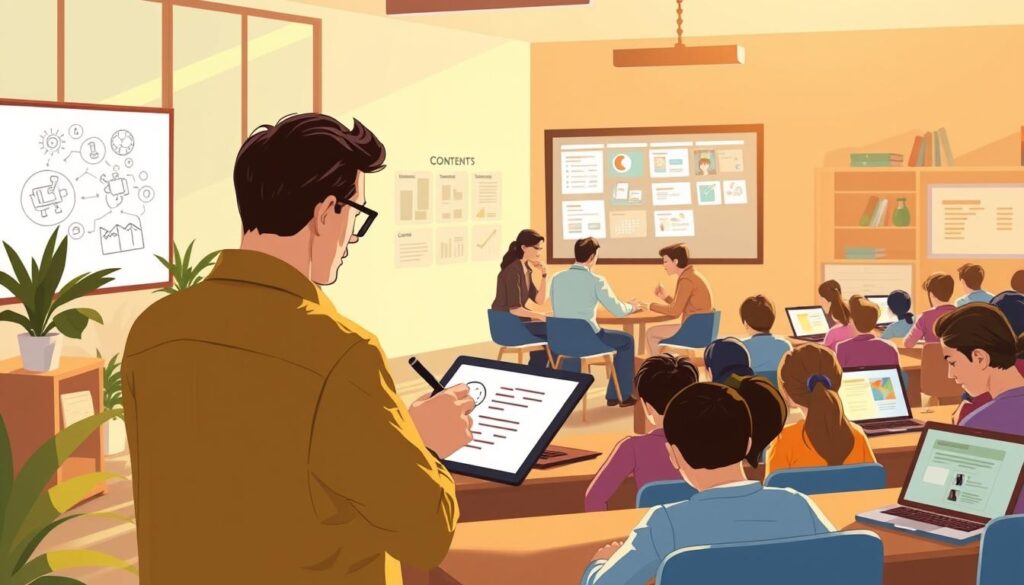Academic institutions are increasingly recognising the importance of high-quality content to engage their audiences and foster a culture of learning. Effective educational content communicates complex concepts in an accessible manner, encouraging discussions and collaborative learning.
The digital age has transformed the way knowledge is disseminated in academic settings. Institutions now require content writing services that can produce engaging, informative materials. By leveraging professional writing services, academic institutions can enhance their teaching materials, research publications, and institutional communications.
Key Takeaways
- Professional educational content writing services can elevate the quality of academic materials.
- Engaging content fosters a culture of learning and collaboration.
- Effective content writing is crucial for communicating complex concepts.
- Academic institutions benefit from high-quality content in their teaching and research.
- The digital age has reshaped the way knowledge is communicated in academia.
The Power of Educational Content Writing in Academia
Educational content writing has become a vital component in academia, transforming the way institutions communicate knowledge and engage with their audience. This form of writing is crucial for creating materials that are both informative and explanatory, helping learners acquire new skills and understand complex concepts.
Defining Educational Content Writing for Academic Settings
Educational content writing in academic settings involves crafting materials that effectively communicate complex concepts while maintaining scholarly integrity. It requires a balance between intellectual rigour and accessibility, ensuring that sophisticated ideas are presented in a clear and concise manner. This type of writing is essential for facilitating understanding and promoting learning among diverse learners.
Unlike general content writing, academic educational content must be tailored to meet the specific needs of students and educators, providing information that is both relevant and accurate.
The Evolution of Educational Content in the Digital Age
The digital transformation has revolutionised educational content, shifting from static textbooks to dynamic, interactive learning experiences. Modern educational content writing incorporates multimedia elements, interactive components, and personalised learning paths, making it possible to cater to different learning styles and preferences.
This evolution reflects broader changes in pedagogy, moving from passive knowledge transfer to active learning experiences that encourage critical thinking and practical application. As a result, academic institutions now require content that works across multiple platforms, from traditional classroom settings to digital learning environments.
Why Academic Institutions Need Professional Educational Content Writing

The need for professional educational content writing services has become paramount in today’s competitive academic landscape. Academic institutions are under increasing pressure to produce high-quality content that not only engages students but also showcases their expertise and authority in various fields.
Enhancing Student Engagement and Learning Outcomes
Professional educational content writing transforms academic materials from mere information delivery to powerful engagement tools that capture students’ attention and enhance knowledge retention. By crafting compelling content, institutions can significantly improve learning outcomes.
Building Institutional Reputation and Authority
In today’s competitive academic environment, institutions with compelling, authoritative content stand out, attracting top students and faculty while building credibility in their fields of expertise. Professional writers bring fresh perspectives and specialised skills in communicating complex ideas clearly.
Meeting the Diverse Needs of Modern Learners
Modern learners have diverse needs, learning styles, and expectations shaped by digital experiences; professional content writers understand these dynamics and create materials that resonate with various audience segments. By doing so, they help institutions maintain consistency across all materials, ensuring that the institutional voice and quality standards remain uniform.
Investing in professional content writing allows academic staff to focus on their core responsibilities of teaching and research rather than struggling with content creation. By providing valuable educational content, institutions can increase brand awareness, gain a loyal audience, and establish their authority in the field.
Types of Educational Content for Academic Institutions
Educational content in academic settings encompasses a broad spectrum of materials and formats. This diversity is essential to cater to different learning preferences, styles, and needs. The versatility in educational content ensures that it can be tailored to achieve various educational objectives.

Course Materials and Curriculum Resources
Course materials and curriculum resources are fundamental to the educational process. These include syllabi, lecture notes, textbooks, workbooks, and interactive learning modules that guide students through their academic journey. Effective course materials are designed to engage students and support learning outcomes.
Research Publications and Academic Articles
Research publications and academic articles are crucial for showcasing institutional expertise and contributing to knowledge advancement. These publications require a balance between scholarly rigour and readability. They are essential for establishing the credibility and reputation of academic institutions.
Student Support and Guidance Materials
Student support materials address practical needs beyond the classroom. These include orientation guides, study skills resources, career development materials, and mental health information that enhance the overall student experience. By providing these resources, institutions can support students’ academic success and well-being.
Institutional Marketing and Communication Content
Institutional marketing content, such as prospectuses, alumni magazines, and digital communications, requires educational content writing that captures the institution’s voice while engaging diverse stakeholders. This type of content is vital for promoting the institution’s brand and attracting prospective students.
The diversity in educational content types and formats allows academic institutions to effectively communicate with their audience and achieve their educational goals. By leveraging various content formats, institutions can cater to different learning needs and preferences, ultimately enhancing the educational experience.
- Blog posts and articles for informational and engaging content
- Ebooks and white papers for in-depth analysis and research
- YouTube videos and educational videos for visual learning
- Social media posts for community engagement and updates
- Webinars and online courses for interactive learning experiences
Key Elements of Effective Educational Content Writing
The art of creating compelling educational content lies in balancing several key elements. Effective educational content must be both intellectually rigorous and genuinely engaging for learners. This balance is crucial for maintaining students’ interest and enhancing their understanding of complex concepts.
Clarity and Accessibility in Academic Writing
Clarity and accessibility form the foundation of good educational writing. Complex ideas must be expressed in straightforward language without sacrificing accuracy or depth of understanding. Using simple language and breaking down topics into manageable sections can significantly improve comprehension. For instance, avoiding jargon and technical terms unless they are essential to the subject matter can make the content more accessible to a broader audience.
Engaging Storytelling and Real-World Applications
Storytelling transforms abstract concepts into memorable learning experiences by connecting academic theories to real-world scenarios that resonate with students’ lives and aspirations. Using relatable examples and anecdotes can make complex information more engaging and easier to retain. For example, illustrating a mathematical concept with a real-world application can help students understand its practical significance.
Visual Elements and Multimedia Integration
Visual elements and multimedia integration cater to diverse learning preferences, with diagrams, infographics, videos, and interactive elements reinforcing written content and enhancing comprehension. Incorporating various media can help to convey complex information in a more digestible format. For instance, using infographics to summarize key points or illustrate data trends can be particularly effective.
| Media Type | Benefits | Examples |
|---|---|---|
| Infographics | Visual summary, enhances retention | Statistical data representation, process illustrations |
| Videos | Engaging, explains complex concepts dynamically | Tutorials, lectures, demonstrations |
| Interactive Elements | Promotes engagement, interactive learning | Quizzes, simulations, games |
Balancing Academic Rigour with Readability
The most challenging aspect of educational content writing is maintaining the perfect balance between academic rigour and readability. Preserving scholarly integrity while ensuring the content remains accessible to its intended audience is crucial. This can be achieved by using clear and concise language, avoiding unnecessary complexity, and providing scaffolded learning that builds understanding progressively.
Effective educational content writing is an intricate process that requires careful consideration of multiple factors. By balancing clarity, storytelling, visual elements, and academic rigour, educators can create engaging and informative content that enhances the learning experience.
The Process of Creating Educational Content for Academic Institutions
Developing high-quality educational content for academic institutions is a multifaceted process that requires meticulous planning and execution. This process is crucial in ensuring that the content is not only accurate and relevant but also engaging and effective in enhancing learning outcomes.
Research and Subject Matter Expertise
The foundation of excellent educational content lies in thorough research and subject matter expertise. Writers must immerse themselves in the topic, consulting authoritative sources such as research papers, reputable news outlets, and official educational websites to understand current academic discourse.
Collaborative Development with Faculty and Staff
Collaborative development is a key aspect of creating effective educational content. This involves bringing together content writers and academic subject experts to combine communication skills with deep disciplinary knowledge. Effective educational content writers develop interviewing skills to extract knowledge from subject matter experts who may struggle to articulate complex concepts in accessible language.
Editing, Review, and Quality Assurance
The development process typically involves multiple stages, including initial briefing and research, content planning and structuring, drafting, expert review, revision, and final quality assurance. Quality assurance for academic content goes beyond checking grammar and spelling; it involves verifying factual accuracy, ensuring conceptual clarity, confirming pedagogical effectiveness, and maintaining consistency with institutional standards.
The following table illustrates the stages involved in the educational content development process and their significance:
| Stage | Description | Significance |
|---|---|---|
| Initial Briefing and Research | Gathering information and understanding the requirements | Ensures relevance and accuracy |
| Content Planning and Structuring | Organizing content to meet learning objectives | Enhances pedagogical effectiveness |
| Drafting | Creating the initial content | Lays the foundation for further refinement |
| Expert Review | Reviewing content for accuracy and relevance | Ensures subject matter expertise |
| Revision and Final Quality Assurance | Refining content based on feedback and ensuring quality | Guarantees high-quality content |

Benefits of Outsourcing Educational Content Writing

By outsourcing educational content writing, academic institutions can tap into specialised expertise that enhances their educational offerings. This strategic move enables institutions to elevate the quality of their content, making it more engaging and effective for students.
Access to Specialised Expertise and Fresh Perspectives
Professional educational content writers bring a unique skill set that complements the research and teaching expertise of academic staff. Their ability to communicate complex ideas clearly and concisely is invaluable in creating high-quality educational materials.
Moreover, external writers introduce fresh perspectives that can transform how academic concepts are presented, fostering innovative approaches that might not emerge within established institutional thinking.
Time and Resource Efficiency for Academic Staff
Academic staff face increasing demands on their time, making it challenging to balance teaching, research, and content production. Outsourcing content writing allows faculty to focus on their core responsibilities, such as student mentorship and research, rather than diverting their attention to content creation.
Professional writers work efficiently within established processes, often delivering high-quality content more quickly than academic staff who must juggle multiple responsibilities.
Consistent Quality and Regular Content Updates
Outsourcing educational content writing ensures consistent quality across all educational materials. Professional writers maintain stylistic coherence and adhere to institutional standards and guidelines, guaranteeing that the content meets the required quality standards.
External content services can also provide regular updates to keep materials current with the latest research and pedagogical approaches, which is particularly valuable in rapidly evolving fields.
How to Choose the Right Educational Content Writing Service

With numerous educational content writing services available, academic institutions must carefully evaluate their options to find the best fit. Selecting the right service is a critical decision that impacts the quality and effectiveness of an institution’s educational materials.
Evaluating Subject Matter Expertise and Academic Credentials
Subject matter expertise should be a primary consideration—the best services employ writers with relevant academic backgrounds or provide systems for pairing content projects with writers who have appropriate disciplinary knowledge. This ensures that the content is accurate, up-to-date, and aligned with the institution’s academic standards.
Assessing Writing Quality and Portfolio Examples
Evaluating writing samples and portfolios reveals a service’s ability to communicate complex ideas clearly, maintain an appropriate academic tone, and engage readers effectively across different content types. Institutions should look for services that provide diverse examples of their work.
Understanding Pricing Models and Service Packages
Pricing models vary widely among educational content services; institutions should look beyond base rates to understand the full value proposition, including revision policies, research depth, and collaborative processes. A service that offers flexible pricing and tailored packages can provide better value for the institution.
Importance of Communication and Collaboration Processes
The most successful partnerships between institutions and content services feature robust communication channels and collaborative workflows that integrate academic experts throughout the content development process. Institutions should seek services that prioritize collaboration and have a clear understanding of their specific needs.
By carefully evaluating these factors, academic institutions can make an informed decision when choosing an educational content writing service that meets their needs and enhances their educational materials.
Case Studies: Successful Educational Content Strategies in UK Academic Institutions
The integration of professional educational content writing services has marked a new era in UK academia, focusing on student-centric learning. This shift is evident in several case studies that demonstrate the transformative power of strategic content in enhancing learning experiences and outcomes.
University Course Materials Transformation Project
A Russell Group university embarked on a project to revamp its traditional course materials into engaging, multimedia learning resources. By integrating consistent narrative structures, real-world applications, and interactive elements, the project catered to diverse learning styles while maintaining academic rigour. The outcome was a significant 32% improvement in student satisfaction scores.
Research Dissemination and Public Engagement Initiative
Another prestigious institution undertook an initiative to translate complex research findings into accessible content for public engagement. Professional writers collaborated with researchers to preserve scientific integrity while crafting compelling narratives that resonated with non-specialist audiences. This effort led to increased media coverage and a broader public understanding of valuable academic work.
Student Support Resources Development Programme
A university also launched a programme to develop student support resources, addressing diverse student needs through carefully crafted content. Guidance was provided on everything from academic skills to wellbeing, enhancing the overall student experience. The programme highlighted the importance of audience-centred design and rigorous quality assurance processes.
These case studies underscore the importance of clear strategic objectives, close collaboration between content professionals and academic experts, and a focus on the reader’s needs. By leveraging technology and professional content writing services, UK academic institutions can significantly enhance the learning experience and outcomes for their students.
Conclusion: Investing in Quality Educational Content for Academic Success
Quality educational content is the backbone of any successful academic institution. It represents a strategic investment that yields returns across multiple dimensions of academic success—from enhanced student learning outcomes to strengthened institutional reputation.
The digital transformation of education has elevated the importance of well-crafted content that engages learners across multiple platforms and accommodates diverse learning preferences and needs. By prioritising professional educational content writing, academic institutions can gain competitive advantages in student recruitment, retention, and satisfaction while supporting faculty effectiveness.
For institutions looking to elevate their content and improve their online presence, exploring options like quality content creation services can be beneficial. Investing in quality educational content is ultimately an investment in the core mission of academic institutions—to facilitate learning, advance knowledge, and prepare students for future success at this time.






